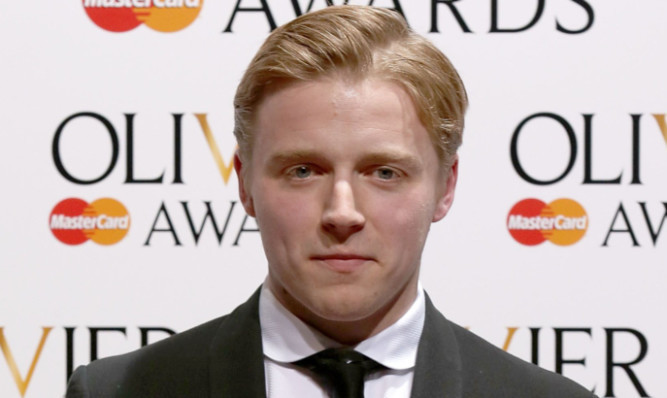
Scotland’s hottest new actor says being a screen star is second to being a football hero.
Jack Lowden is the leading light in BBC 1’s big new five-part World War One drama The Passing Bells. But the 24-year-old from Oxton in the Borders says acting really wasn’t his boyhood dream.
“I always wanted to be a footballer and I’ll never stop wanting that,” Jack told The Sunday Post.
“I think a lot of us are frustrated sportsmen. My dad Gordon played for Rangers on a schoolboy form and I’ve always been obsessed with it.
“My dad, brother and I have season tickets for Broxburn Athletic juniors and I get along as much as I can when I’m up from London.”
Jack catches up with his Edinburgh-based girlfriend Vicky as much as possible, too, but London’s now home thanks to his thriving acting career.
He’s starred in TV dramas such as Mrs Biggs and The Tunnel and won an Olivier Award for his acclaimed stage performances after the “terrific platform” provided by the Royal Conservatoire in Glasgow.
But while younger brother Callum dances with Royal Swedish Ballet, Jack insists there was no theatrical inspiration at home.
“Neither my dad or my mum Jacqui came from arty backgrounds. Dad worked for the Bank of Scotland for 40 years and mum did lots of things including being a veterinary nurse,” Jack adds.
“When I realised I’d never make it in football this seemed like a fun way to make a living. Callum’s been a massive inspiration because he works so hard, he’s essentially an athlete. Actors don’t need to work at all in comparison.”
Jack says he did have the backing of a dedicated music teacher at school who encouraged him to develop his artistic side.
The affable young actor plays the lead German in The Passing Bells which follows the war, from 1914 to 1918, from both sides.
“It was fascinating,” insists Jack. “All through school you’re taught it from the British side but it was all about young men, some just happened to wear different uniforms. They were shooting at each other from 200 yards away, gaining very little ground and little advantage.
“They came from similar communities and suddenly they’re stuck in a field in France.”
Filming took place in Poland, with support as extras coming from groups of military re-enactment buffs. There was no shortage of action for Jack.
“Things flit between home and the front so there is a fair bit of family drama,” he explains.
“But there was plenty of the military stuff. We had to learn the drills and thing like how to take a rifle apart. I also spent a whole day being chased in a forest by a quad bike with a couple of cameras on it.
“There was a lot of mud, as you’d expect. But we actually filmed in the summer when it was about 30 degrees. We were trying to convey the cold of a Russian winter, which was quite challenging. And there were lots of explosions with dirt and debris being thrown into the air.
“We had safety experts on hand to make sure we were never in harm’s way.”
But Jack says he was always more than aware that things couldn’t have been more different for the young men a century ago.
“Being kept safe was a luxury obviously as we were just pretending. We got to go home each night to a comfy bed and a nice meal which none of those guys did.”
He admits The Passing Bells made quite an impact.
“I can say look back and say that in the year of the 100th anniversary, I was in something to help remember it,” he adds.
“You want to do these guys a little bit of justice. I don’t think you can tell enough about that period. It really did bring it very much home to me.”
Jack’s currently sharing a stage with Kristin Scott Thomas at the Old Vic and forthcoming projects include a part in the Hugh Jackman movie, Pan.
As he leaves he wryly admits that swapping football for acting is “working out well at the moment.”
The Passing Bells: BBC1, Monday to Friday, 7pm.
Interested in World War One? Follow our very own WW1 soldier William Shaw who, through the magic of twitter, is detailing life in the trenches 100 years on.

Enjoy the convenience of having The Sunday Post delivered as a digital ePaper straight to your smartphone, tablet or computer.
Subscribe for only £5.49 a month and enjoy all the benefits of the printed paper as a digital replica.
Subscribe